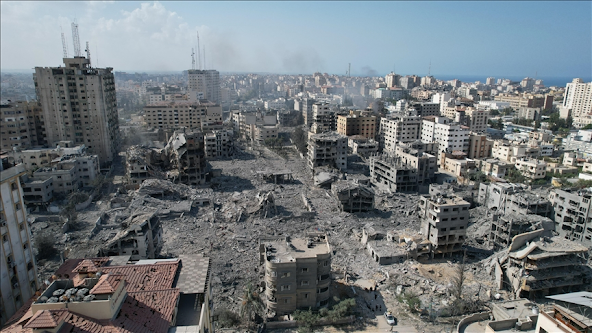A couple of weeks ago, my brilliant comrade Harry Browne was speaking on Irish radio about a speech or interview by Kamala Harris. Harris's status as the Democrat candidate in November's US presidential election was not at this time confirmed. The interviewer, the professional but stolid Pat Kenny, asked what Browne thought of comments Harris made about the need for a ceasefire in Gaza. And Browne replied sardonically that he thought that the term 'ceasefire' in political and media discourse had become an 'empty signifier', like the much-fetishized 'two-state solution'. Both terms are forms of words which have been evacuated of substantive meaning and which really only function within the discourse - they have no purchase on the real world of blood and bone, refugees and genocidal governments, 2000lb bombs and the return of polio in the Strip. Worse, both terms can be seen to operate as fig leaves, providing cover for colonisation, resource theft, ethnic cleansing, racism and genocide.

Now Tom Stevenson, who writes on security issues for the London Review of Books, has published a superb critique of the 'ceasefire talks' which elaborates on Harry Browne's shrewd point. Stevenson's article is so important I am going to print it in its entirety here in this blog, rather than just providing a hyperlink.
Conor
____________
All Talk, No Ceasefire
Tom Stevenson
LRB Vol. 46, No. 18
For the last nine months, representatives from the United States, Israel, Egypt, Qatar and Hamas have ostensibly been negotiating a ceasefire in Gaza. The delegations have met more than a dozen times, though it’s hard to point to anything that would be different had they not. Over the months the talks have taken a predictable form. Negotiators are convened. Unnamed officials say that, this time, they are optimistic about a deal – right up until the proceedings break down. The US has presented a succession of final proposals that have led nowhere. On 25 March, the UN Security Council passed Resolution 2728, which called for a ceasefire over Ramadan followed by ‘a lasting sustainable ceasefire’. The resolution was months overdue, meagre in itself and passed after thousands of Palestinians had already died. It has not been heeded. Since the beginning of Israel’s assault on Gaza, Benjamin Netanyahu has repeatedly said that Israel will not agree to a ceasefire without ‘eliminating Hamas’ and ‘total victory’. Yet the talks continue.
Information about the negotiations has come out in controlled bursts. Hand-picked reporters write up stories based on intimations from members of the US and Israeli governments. Headlines are written about hard work and steady progress that are contradicted even within the story below. Negotiators shuttle between Cairo and Doha – there have also been a couple of excursions to Paris and Rome, presumably for reasons of scenery and gastronomy. There has been no ceasefire, but for the mediators there are consolations. For the witless chief of Egyptian intelligence, Abbas Kamel, trips to Tel Aviv and the opportunity to pretend to be more than an office manager to President Abdel Fattah el-Sisi. For Qatar’s foreign ministry officials, a chance to display their country as neutral ground where the US and its allies are ‘pressuring both sides to commit to a deal’. For the CIA director, William Burns, the whole thing has seemed to be more of a burden, only occasionally relieved by passing off duties to the Middle East proconsul, Brett McGurk.
In Doha, the delegations from Israel and Hamas are installed in separate rooms, across the corridor from each other, in a private wing of a luxury hotel. American, Qatari and Egyptian officials go between them carrying messages. In Cairo, they are whisked off to an unknown location, probably in one of the many compounds owned by the Egyptian armed forces. At the end of May, Joe Biden announced a framework for an agreement on what he described as an ‘Israeli ceasefire proposal’, which was immediately rejected by Israel. According to the plan, a ceasefire would be declared and Israeli forces would begin to withdraw from Gaza. The remaining hostages would be released in stages, in exchange for Palestinian prisoners held by Israel. Over the first six weeks, the Israeli army would withdraw from major population centres and humanitarian aid would be allowed in. Air operations over the strip would be suspended for ten hours a day. During two subsequent phases the remaining captives would be exchanged, and the details of a permanent ceasefire would be confirmed. The only problem was that the Israeli government had no intention of halting military operations. And Hamas persisted with the vexatious demand that a ceasefire should involve the ceasing of fire.
As early as March, the White House was said to have ‘lost its patience’ with Israel’s intransigence. Yet enough patience was left for it to be running out again in June, and in August. In May, a ‘source close to the White House’ noted that one difficulty was the scale of Israel’s demolition of Gaza, which meant that getting messages to and from Hamas leaders there had ‘at times been difficult’. On 7 July, Netanyahu reiterated that any agreement must allow Israel to continue fighting in Gaza. In other words, there could be no agreement. Yet three days later in Doha, US officials were ‘more optimistic than ever’. When Israel’s rejection of the May framework was at last admitted, the US presented a new ‘comprehensive bridging proposal’. It was vague about whether a ceasefire or a temporary truce was needed, and whether Israeli forces would remain in Gaza indefinitely. Israel was now insisting that Hamas agree to indefinite Israeli control over Gaza’s southern border with Egypt and over the Netzarim corridor that now bisects the strip. After a negotiating round in Cairo, the White House spokesperson John Kirby said on 23 August that ‘there has been progress made.’ All that was needed was for ‘both sides to come together and work towards implementation’.
The background to the negotiations has been the continued destruction of the Gaza Strip. Between two rounds of talks in July, a polio outbreak was reported in Gaza, which had been polio-free for more than 25 years. Epidemics were a predicted consequence of Israel’s actions, with even soap having quickly become rare (in the tent camps, many people resort to using abrasive sand). Talks in Rome were capped off with the assassination in Tehran on 31 July of the head of Hamas’s political bureau, Ismail Haniyeh. On 28 August, the day its negotiators travelled to Doha, the Israeli army launched an attack on Jenin in the West Bank. Even the roads were bulldozed. ‘Israel has decided to turn the West Bank into the Gaza Strip,’ an editorial in Haaretz claimed.
After the talks in August in Doha, the US national security adviser, Jake Sullivan, said the discussion had got ‘to the point where it is in the nitty gritty, and that’s a positive sign of progress’. In reality the central problem remained: Hamas is willing to exchange the remaining hostages for a ceasefire; Israel isn’t. At the beginning of September, US officials said they were about to present a ‘take it or leave it’ deal. The director of Mossad, David Barnea, travelled back to Doha. He said Israel was ready to withdraw from the so-called Philadelphi corridor (along Gaza’s southern border) in a potential deal. But hours later, Netanyahu gave a televised address in which he said that Israel must occupy the Philadelphi corridor indefinitely. It’s very unlikely that Israeli forces would be able to control the corridor without also maintaining control of the roads leading to it, which means there will be no withdrawal of Israeli soldiers. The Doha talks duly collapsed and US officials, who had the day before briefed that a deal was close, switched to saying that the talks had been derailed in advance by Hamas when it executed six of the hostages it took on 7 October, whose bodies were located by Israeli forces on 31 August.
The former Israeli prime minister Ehud Olmert had a different view: Netanyahu, Olmert said, had ‘sabotaged the negotiations’. More than that, the talks themselves were a sham. ‘We must shake off the illusion that the negotiations for a deal to free the hostages under Netanyahu’s guidance are being held in good faith,’ Olmert wrote in Haaretz. Instead, the talks were better understood as ‘a game in which there is no intention of reaching an agreement’. Netanyahu has made clear at every opportunity that he does not intend to withdraw Israel’s armed forces in a negotiated ceasefire. During the one-week truce last November, Hamas released 105 hostages (by contrast, only eight have been recovered by Israeli forces). But despite pressure from the families of the hostages for some sort of deal, the Israeli security cabinet has at every stage thrown up decoys to mask the obvious fact that it prefers to continue its genocidal rampage and is unwilling to stop in exchange for the lives of the remaining hostages.
What then does Israel intend? The evidence from Gaza is that it wants to go on as it has been. A week after the 7 October attacks, Israel’s Ministry of Intelligence produced a white paper outlining three options for the future of Gaza after an Israeli assault. The first was to install the Palestinian Authority in Gaza, the second was to form a new authority under the supervision of the Israeli army, and the third was the wholesale deportation of the population. Israeli forces have driven most Gazans from their homes, but not from the strip. On 28 August, the IDF appointed General Elad Goren as its chief officer in Gaza. A ‘senior defence official’ told Ynet that ‘this is not a temporary project; this position will be with us for years to come.’ Some parts of Israel’s security apparatus are ambivalent about whether they are capable of operating in Gaza over the long term. But for now Israel’s preference appears to be for some version of military control.
The ‘ceasefire talks’ seem to exist mainly so that the fact they took place can be reported. At every stage they are said to be ‘constructive’. Progress is being made. Details are being ironed out. Never mind that nothing has in fact happened. The rolling diplomatic pseudo-event is an end in itself. In this respect the talks are similar to the debacle of the US floating pier, when US forces jerry-rigged a pontoon to get humanitarian aid into a territory that its closest ally was besieging. The pier was afloat and operational for less than three weeks, during which it enabled the delivery of a token quantity of food aid, some of which rotted on the shore. It was then dismantled, with its mission declared ‘complete’. The absurdity of the scheme almost seemed to be the point. The ceasefire talks have a similar air. What have they been except a smokescreen for the killing? A face-saving exercise, perhaps. And, in a US election year, the smallest possible concession to domestic aversion to the horrors in Gaza. More than that, they were an attempt to impart the impression, against all the evidence, that the US is a neutral party tirelessly working for peace.
It’s an old motif in the mythology of Israel-Palestine: peace negotiations stalled by intransigent participants, with supposedly neutral mediators sweating through their suits in search of an elusive breakthrough. On 7 September, Burns and the head of MI6, Richard Moore, wrote a joint article in which they claimed their two organisations were ‘working ceaselessly to achieve a ceasefire and hostage deal’ – presumably in between ammunition runs and sending Israel targeting imagery of Gazan tents from their satellites and reconnaissance planes. On 2 September, the British government was widely reported as having shifted its policy when it annulled thirty arms export licences to Israel. In fact Britain has maintained 92 per cent of its arms supply contracts, including all of those that include components for Israel’s F-35 fighter jets. British bases on Cyprus remain a critical node of international support for the destruction of Gaza. For the US, the exoteric appearance of acting as neutral arbiter (while in practice being the war’s main sponsor) is not a new role. Israel could not continue the war without the support it enjoys from the US. Were that support to be withdrawn, and the flow of munitions, aid, diplomatic cover, intelligence and surveillance services to stop, Israel would be forced to change its actions.






















